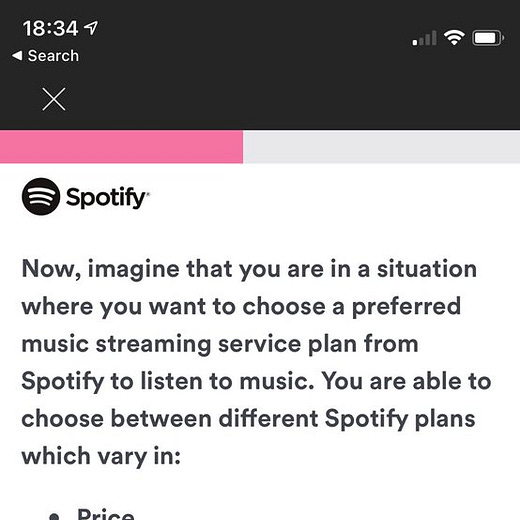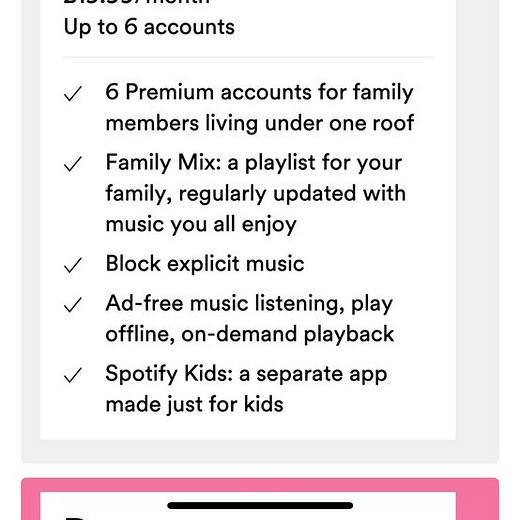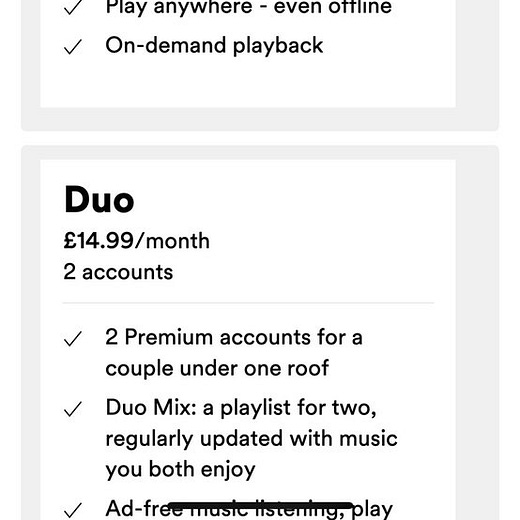spotify
One of the sillier ways to do journalism is when companies don't bother to check if you're a journalist before running experiments on you. It's not big, and it's not clever, but it's quite satisfying to realise that you've been given a story just by being a normal customer of a company.
Anyway, earlier this week Spotify ran some market research to test a range of price rises across its premium accounts, and I was pulled in to a poll. It's not the most earth-shattering scoop, but I thought it worth sharing, both out of an innate drive to perform acts of journalism, and because it's an interesting sign of how Spotify is thinking.
The short version is yes, Spotify is thinking of raising its prices. A range of increases were tested, with various distributions across the three premium accounts the company offers (Individual; Duo, which is aimed at couples and includes two accounts and a shared playlist feature; and Family, aimed at families, including six accounts and a few kids features).
The goal is clearly to come to a more nuanced decision than simply increasing prices across the board: instead, Spotify wanted to find out what the substitution effects would be: how many people with a Family account would drop down to a Duo account if the prices became too unbalanced, for instance. And, conversely, how many people might upgrade to a duo account if the price of an individual account rose too much? That, of course, could be good or bad for Spotify, depending on whether the "upgrade" involved two people deciding to finally stop sharing their account, or two people deciding to stop paying for two individual accounts.
But the proposed price rises were also interesting in another way. While Spotify did ask for opinions on an increase in the price of an individual account, including an option where it rose by 10% to £10.99, the majority of the changes were for the duo and family accounts – including a proposal that the latter rises an eye-watering 33% to £19.99.
Spotify has been outspoken about the competitive pressure it faces at its premium tiers. The company is proud to be the only major streaming service left that isn't an offshoot of a deep-pocketed tech giant, and mentions it whenever the matter of competition is brought up. It's already being undercut by Amazon, and it retains pricing parity with Apple only while you don't count the various bundle discounts available through the company's Apple One tiers. Unlike the video streaming sector, where prices have been ratcheted up over the past couple of years, music has a firm downward pressure.
Which is where Spotify's Duo and Family plans come in. I'm perennially surprised by the fact that Spotify remains one of the only companies to have introduce pricing plans with this structure, because it seems an absolute no-brainer due to the ubiquity of account sharing.
Account sharing is rife amongst streaming services, and is clearly semi-tolerated, just like Windows piracy in days of yore, because it offers an acceptable on-ramp for users who might not be able to afford the full service. Spotify would prefer a paying user, of course, but it would prefer a non-paying user to someone on a different platform entirely.
When platforms do fight account sharing, they do it with a small amount of stick, and a lot of carrot. No-one wants to sue their own customers – well, the US recording industry does, but that didn't really end well for them – and so the most stick that's feasibly on offer is making it harder to share accounts in the first place. In practice, that usually comes down to making it impossible to use the same account from two different places, and not much else. The carrot, meanwhile, is various attempts to make it preferable to pay, even if you don't have to: algorithmic recommendations being a significant one, since no-one likes discovering their ex-flatmate's love of Steps has poisoned their Discover Weekly.
Spotify's chief weapon in the war has been its duo and family accounts. While not as generous as Apple's family sharing, they're still damn good deals: £15 gets you £60 worth of individual accounts, and access to a few unique features, including a special locked-down mode for kids, and a playlist that's personalised to the whole family's tastes. (Which, admittedly, is useful in a limited set of situations). Even the Duo option is great for couples – particularly if you're both working from home side-by-side and enjoy some music to drown out the silence.
And what this pricing review says to me is that Spotify's finished the job. Account sharing is largely defeated. And now, the company's able to begin cranking up the price on the one product where it has a bit more freedom to move than its competitors.
As a long-time Spotify user – and one who, for all the company's faults, still thinks it's better for the state of music if it thrives than fails – I hope that guess is right.
NFTs, cont.
I wanted to do a little addendum to last week's email, based on an email from Robin Sloan, who's experimented with minting his own tokens. He asked me not to directly quote his thoughts, "written in haste over coffee & peanut butter toast", but to paraphrase: playing in the crypto space is expensive. Really, really expensive.
Almost all major NFTs are built on the Ethereum blockchain, which is horribly congested, because cryptocurrencies are a grotesquely inefficient way to do computing in general. In order to do anything with any speed on the blockchain, you have to pay transaction fees, which bump your request up the queue based on how much you're willing to pay. "Transaction fees", for those who are used to normal online payments, sounds frustrating-but-manageable: a percent, maybe, of the money you're moving.
They are not.
Any interaction at all with the Ethereum blockchain will cost around $50. That's not just the big ones – minting an NFT, buying one – but also smaller ones: placing a bid in an NFT auction, or even removing a bid from an NFT auction. You could not pay the fee, or offer less, but then you'd have no way of knowing when, or whether, your transaction would actually get processed.
Sloan suggests that the friction of those fees may itself be part of the reason for the wild inflation in NFT value. If your view of the ecosystem is anchored by the fact that it costs hundreds of dollars to do anything on it, well, you're unlikely to offer pennies for a collectible kitty; far more likely, you're going to focus your mind on tokens worth hundreds or thousands of dollars.
Like so much in the sector, this criticism tends to be hand waved away – the congestion will clear, there's only a few tweaks left to do before Ethereum 2.0 launches, there are side chains and off-chain transactions and all kinds of possible answers. But until then – and "then" could well just never come – it's a bad vibe all round.






This article saved me £2 a month as I was paying for Spotify Family for me and my partner, and didn't know that Duo existed. Thanks Alex!